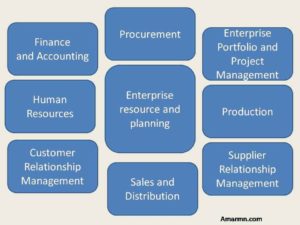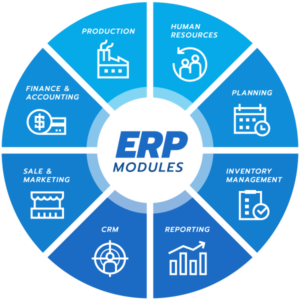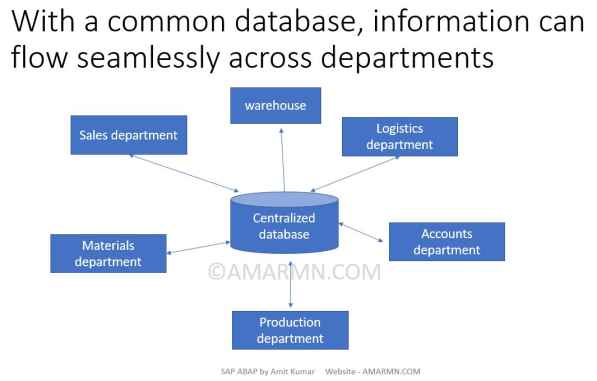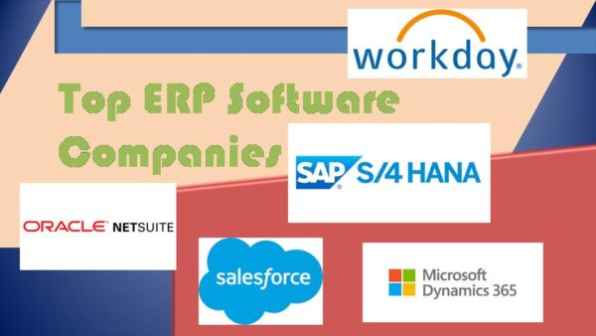What is ERP?
ERP stands for Enterprise Resource and Planning. ERPs are business management software that allows an organization to use a system of integrated applications to manage business processes in real-time, mediated by software and technology.
Two aspects are very clear from the above definition. ERPs are business management software and consists of a system of integrated applications. Its a suite of integrated applciations that an organization uses to collect, store, manage and interpret data from various business activities.
What is Enterprise, what is Resource and what is Planning?
Enterprise is a company or a business with some goal to achieve.
Every business needs some resources to run. Three most basic resources to run a production enterprise can be land, labor and capital. A company resource normally consists of the following: human resources, financial resources, material resources and Intangible assets.
Its easy to understand human and financial resources. Material resources are tangible assets and some examples of material resources are Machinery, real estate, Office Premise, Office equipment including computers, Tools and Products.
Intangible assets relate to knowledge or intellectual property of a business such as Patents, Copyright, Trademark , etc.
Planning: the optimum utilization of these resources. Definitely, managing these high number of resources can not be an easy task.
So we do need a business management software system that integrates the numerous business processes like finance, HR, manufacturing, supply chain, procurement, production and many other services into a single business system that will facilitate in smooth and automated functioning of the business along with optimum utilization of resources.
Considering the complex processes that a business involves, it does makes sense to opt for a good ERP software system.

Typical Business Process: Key observations
Let’s think of an enterprise that manufactures some product. This enterprise will have core business departments like Finance and Accounting, Logistics, Production and Human resource department. Only these departments!! Absolutely NO. It will have further departments like Customer relationship department to interact with customers, Vendor relationship department to interact with vendors who supply goods and services to this enterprise. Further they should have a Sales department, Marketing department, Transportation department, dealers and distributors network, and manufacturing plants at various locations. The below image explains this visually.

The above can also be called as core processes of a business. These departments do not work in isolation and co-ordination between them is important to successfully run an enterprise. These departments continuously communicate and exchange data with each other.
ERP software integrates various business processes into a single system. A key aspect of ERP systems is use of a centralized database to store data for various system modules. A company having an ERP software in place can also rely on consistency of data among its various business processes. ERP software guarantees consistency of data throughout the system
Problem with Decentralized system


- Numerous disparate information system
- consolidating data is time and money consuming
- inconsistencies and duplication of data
- cannot make optimum use of resources man, money, material and machine
Centralized system advantages

- data maintained in a centralized database management system and shared with various departments
- access to real-time data of other departments
- eliminates inconsistency and duplication of data
- increase productivity, reduce cost, and makes optimum use of resources
- better informed CRM team leads to improved customer service
Best ERP software companies

The leaders in ERP software with prominent market shares are SAP, Oracle Corp. and Microsoft. With time ERP software have evolved. The modern ERP software applies machine learning and AI – to provide intelligence, visibility, and efficiency across every aspect of a business.
SAP has been the market leader in ERP software. Founded in the year 1972, they have a huge portfolio of ERP products to meet any customer requirement.
Oracle was founded in the year 1977 and in 1979 they came with their first relational database management system. Oracle entered the ERP software market in the early 2000s and they have established themselves as a major ERP provider company.
The ERP product from Microsoft is know as Microsoft Dynamics.
Workday and Salesforce are also renowned names in the ERP domain.
